The Israeli occupation forces closed all their postal facilites in the Gaza Strip on 4.05.1994 and in Jericho on 9.05.1994, although the Gaza Strip wasn't formally handed over until 17.05.1994. Philatelic last days covers with that date were fabricated by the Israeli Post. On withdrawal of the Israeli military administration from Zone A and (later) Zone B, the Palestinian Postal Administration was established. According to Wallach all outgoing mail had to be franked with Israeli stamps. The stamps printed in Berlin in Summer 1994 (currency "Mils") did not reach Palestine until October, though officially their date of issue is 15.08.1994. I could so far not determine when exactly the post offices were equipped with the new stamps, in any case Israel did not allow outgoing mail franked with Palestinian stamps. Israel declared it would not accept stamps with currency "Mils" or the inscription "Palestine", so the Palestinian Post had to order the Bundesdruckerei Berlin to overprint stamps with "Fils" (officially issued 10.04.1995). According to reports the postmaster of Jericho obliterated "Mils" with _"Fils"_with a small rubber handstamp in June 1995; this local activity was unauthorized. Jericho continued to sell Israeli stamps until November 1995. Israel finally allowed outgoing mail franked with Palestinian stamps in currency "Fils" from 8.11.1995. On withdrawal of the Israeli military administration from Zone A and (later) Zone B, the Palestinian Postal Administration was established. According to Wallach all outgoing mail had to be franked with Israeli stamps. The stamps printed in Berlin in Summer 1994 (currency "Mils") did not reach Palestine until October, though officially their date of issue is 15.08.1994. I could so far not determine when exactly the post offices were equipped with the new stamps, in any case Israel did not allow outgoing mail franked with Palestinian stamps. Israel declared it would not accept stamps with currency "Mils" or the inscription "Palestine", so the Palestinian Post had to order the Bundesdruckerei Berlin to overprint stamps with "Fils" (officially issued 10.04.1995). According to reports the postmaster of Jericho obliterated "Mils" with _"Fils"_with a small rubber handstamp in June 1995; this local activity was unauthorized. Jericho continued to sell Israeli stamps until November 1995. Israel finally allowed outgoing mail franked with Palestinian stamps in currency "Fils" from 8.11.1995. The Ministry of Telecom & Information Technology describes the postal circumstances as follows: The PNA started directing post sector in May 1994 at Gaza Strip and Jericho then at the other main cities in the West Bank. Post infrastructure at that time was very bad as well as other sectors. Before its withdrawal, Israel did the following:— Disconnecting the post bank services from the main center in Jerusalem. Taking the modern equipment and the programmed computer disks. Imposing restrictions and obstacles on the postal services such as, State Sovereignty: Preventing the Palestinian post administration from being a member at the UPU. Preventing the Palestinian post administration from being free at printing post stamps and to be used at the PNA territories. Instead, Israel imposed restrictions on the Palestinian post stamp specifications regarding the text and currency. The Israel Postal Administration returns back the letters with Palestinian stamps rejected by Israel to be changed by the Palestinian post administration with careless of such procedure results of damage and harm. Work Mechanism: In spite of the clear post agreement text which stipulates allowing the abroad Palestinian post exchanged with Arab countries to be delivered at AL Karama and Al Awda crossings, the Israeli authorities made the obstacles for preventing the post dispatches from and to the PNA territories. Delaying the delivery of the coming post dispatches to the PNA territories via the Israeli post due to recurrent closure or under the pretext of customs and security control . Tearing the dispatches and parcels to have a look on its contents, damaging the presents and children toys as well as other contents. Preventing the post vehicles from transferring the domestic post dispatches between the Northern and Southern Governorates, as a procedure of the un -fulfillment of the postal unity within one region vis a vis all world states . In addition to many troubles caused by the Israeli procedures which prevent adding new services such as EMS, postal money draft and others. Source: Ministry of Telecom & Information Technology website. The Ministry of Telecom & Information Technology describes the postal circumstances as follows: The PNA started directing post sector in May 1994 at Gaza Strip and Jericho then at the other main cities in the West Bank. Post infrastructure at that time was very bad as well as other sectors. Before its withdrawal, Israel did the following:— Disconnecting the post bank services from the main center in Jerusalem. Taking the modern equipment and the programmed computer disks. Imposing restrictions and obstacles on the postal services such as, State Sovereignty: Preventing the Palestinian post administration from being a member at the UPU. Preventing the Palestinian post administration from being free at printing post stamps and to be used at the PNA territories. Instead, Israel imposed restrictions on the Palestinian post stamp specifications regarding the text and currency. The Israel Postal Administration returns back the letters with Palestinian stamps rejected by Israel to be changed by the Palestinian post administration with careless of such procedure results of damage and harm. Work Mechanism: In spite of the clear post agreement text which stipulates allowing the abroad Palestinian post exchanged with Arab countries to be delivered at AL Karama and Al Awda crossings, the Israeli authorities made the obstacles for preventing the post dispatches from and to the PNA territories. Delaying the delivery of the coming post dispatches to the PNA territories via the Israeli post due to recurrent closure or under the pretext of customs and security control . Tearing the dispatches and parcels to have a look on its contents, damaging the presents and children toys as well as other contents. Preventing the post vehicles from transferring the domestic post dispatches between the Northern and Southern Governorates, as a procedure of the un -fulfillment of the postal unity within one region vis a vis all world states . In addition to many troubles caused by the Israeli procedures which prevent adding new services such as EMS, postal money draft and others. Source: Ministry of Telecom & Information Technology website. |
| The postal situation must always be seen in close context with the general situation in the liberated parts of Palestine: The entire economy and transport (incl. postal services) is heavily restrained by the Israeli occupation forces, especially since inception of the Al-Aqsa-Intifadah. Palestinian control is restricted to several dozen small patches of urban areas and transport of goods and persons, made almost impossible by check-points and barriers, has often to be ventured upon by dodging these oppressive measures. The exchange of international mail (which must be routed via Israel) is also affected. Letters are increasingly delayed for weeks or break down in Israeli transit; delivery taking three months is now more and more common. Whether that is a result of generally strained lines of communication or deliberate chicanery perpetrated by Israeli military or postal organisation must remain speculation. |
| 2007 sees tentative steps towards normalisation: Media report that since March 2007 direct mail connections between Palestine and Jordan have reopened. Practical effects of the announcement by Jordan Post are yet to be seen. Postal services resume between Jordan, Palestinian territories By Dalya Dajani AMMAN – Postal services between Jordan and the Palestinian territories resumed this week, with mail now set to be delivered swiftly and securely. The new service, which went into operation on Tuesday after a break of many years, was made possible by the Palestinian Firm for Logistics Services, Wasel, in partnership with Jordan Post. Jordan Post Director General Mansour Malhas told The Jordan Times the agreement with Wasel marked a new channel of cooperation between the Kingdom and the Palestinian territories. ''It is a new step forward and paves the way for an essential service for both personal and commercial activities,'' said Malhas. ''People can now send mail to the Palestinian territories through any one of our 356 branches across the country,'' he added. Under the agreement, Wasel will deliver letters, parcels and express mail from Jordan. The company will deliver regular mail to the Palestinian postal authority, which in turn will distribute it to centres in the West Bank and Gaza. Express mail will be delivered directly to the recipient in no more than 48 hours. Wasel, established in June last year, is the first Palestinian company for distribution and logistic services and in charge of all postal services inside the Palestinian territories and abroad including all air, land and sea transport of goods. It is also responsible for commercial crossings in the West Bank and Gaza. Malhas said the agreement will benefit commercial activities and entities including banks, companies and government institutions. Source: Jordan Times (Website) 15.03.2007. PDF version. Thanks to Martin Bohnstedt. |
| During the 24th UPU Congress in Geneve the following declation was published. Whether this agreemenent between the PNA and Israel will be implemented and how it will effect the actaul postal traffice remains to be seen. UNIVERSAL POSTAL UNIONPRESS RELEASE Palestinian Authority to exchange mail directly with UPU member countriesIsraeli and Palestinian Posts agree on a joint declarationGeneva (Switzerland), 7 August 2008 The Universal Postal Union yesterday announced that the Israeli and Palestinian postal authorities had been discussing solutions aimed at improving the operations and quality of the Palestinian Authority's postal services, "with the aim of strengthening international postal cooperation". In a joint declaration read out by UPU Director General Edouard Dayan to the member countries attending the 24th Universal Postal Congress in Geneva, both parties pledged to start facilitating direct exchanges between the Palestinian Authority and the UPU member countries as of now. Mail will transit via Amman, Jordan. Dayan described this declaration as an "important development" in the UPU International Bureau's efforts to help the Palestinian postal service become "better integrated into the world postal community". He added that the announcement would help to prepare the ground for work to develop and improve the quality of the Palestinian postal service, and welcomed the "spirit of dialogue and total cooperation" shown by both parties. "The technical and operational solutions that are envisaged will enable the Palestinian postal services to launch direct mail exchanges, and will establish the rights and duties associated with terminal dues and the UPU Quality of Service Fund." Terminal dues are the compensation countries receive for handling international mail arriving from other countries. The declaration also stated that the two parties had agreed to work on a bilateral basis, and within the framework of the relevant agreements reached between them, to ensure the "rapid, concrete implementation" of these direct exchanges. Dayan also called on the international postal community to lend its support to the Palestinian Authority's postal services. Source: UPU Press Release 7.08.2008. |
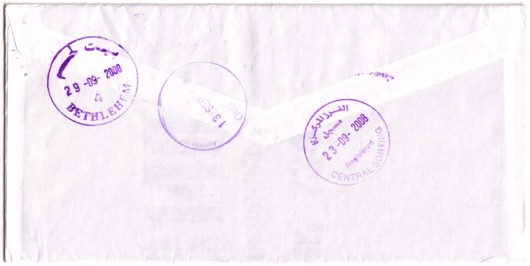 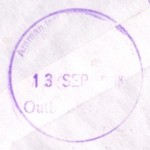 Returned letter, sent "via Jordan", with transit mark "Amman Int ... Outbound ... 13 SEP 2008"; yet no proof for a direct routing from Jordan. Returned letter, sent "via Jordan", with transit mark "Amman Int ... Outbound ... 13 SEP 2008"; yet no proof for a direct routing from Jordan. |
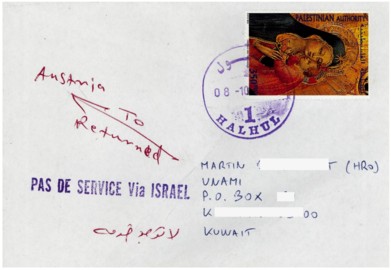 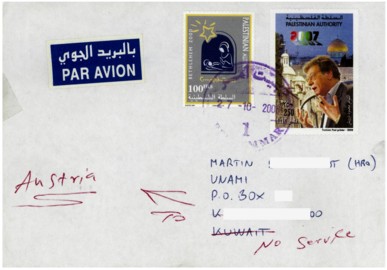 Two letters sent from Beit Ummar and Halhul direct to Kuwait: both were returned to the sender's address in Austria. A sign that the route via Jordan is not (yet?) in operation...Images courtesy Martin. Two letters sent from Beit Ummar and Halhul direct to Kuwait: both were returned to the sender's address in Austria. A sign that the route via Jordan is not (yet?) in operation...Images courtesy Martin. |
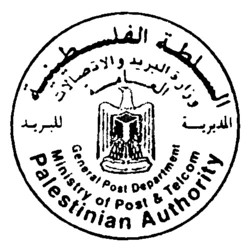 |
Despite all these difficulties and restrictions placed upon the Palestinian Post, it has been able to widen the services it provides (postal charges: Tariff 2012) and to open a number of new postal facilities. Official sources list: General mail services: Domestic letters and postcards Foreign letters and postcards Foreign Air Mail Matters for the blind Printed matters Domestic parcels Foreign parcels (incoming only) Special mail services: Registration Insured matters Advice of delivery Express delivery General mail services: Fax Domestic telegrammes Mail boxes Proposed services: Air parcels Express Mail Service (EMS) The number of post offices was increased by 33 in three year. In 2004 the total number of postal facilities was 82 (complete list), more are opened continually: According to official statistics there were a total of 99 (77+22)Mail Service Centers and 238 (221+17) Mail Service Divisions in 2006. Currently (2008) there are 95 (73+22) post offices. The following able also lists (OV) the number of towns and villages with more than 2,500 inhabitants not served by a local office (complete list). 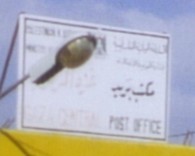 Governorate 94 04 08 OV Changes North Gaza 3 4 4 2 Jabalia (1999) Gaza 4 4 5 3 Alremal (closed 1996), Omer El Mokhtar (1996), Central Sorting Office Deir el-Balah 2 5 5 2 Alburage (1994), Almghazi (1995), Alzewaida (1995) Khan Yunis 2 6 5 5 Abasan Alkabira (1995), Algrara (1995), Alamel (1995–?), Khuzaa (1997) Rafah 1 3 3 3 Alawda Crossing (1995–?), Tal El Soltan (1995), Terminal Rafah (1995–1998?) Gaza Strip 12 22 22 15 Jenin 5 10 12 14 Alzebabda (1995), Alyamoon (1998), Sielet Alharethiya (1998), Maythelon (2003), Kfer Raei (2003), Ajja (2003), Alkafreyat (2005) Tubas 1 2 2 2 Alfar'a Camp (2005?) Tulkarm 4 7 8 10 Baga Shargeia (1997), Balaa (1998), Qeffin (2001), Illar (2005) Qalqilya 2 4 7 2 Hebla (1997), Kefer Qaddom (2003), Jayyus (2004), Hajja (2005), Kafr Thulth (2005) Salfit 2 2 3 4 Bedia (1995), Deir Istiya (2005) Nablus 1 3 5 24 Beit Amraen (1997), Asira Ashamaliya (?), Burqa (2005) Ramallah & Al-Bireh 8 13 14 27 Ramallah Government Complex (1996), Ebwin (1997), Mazrae Sharqia (2001), Beir Nbala (2001), Babi Zaed (2002), Central Sorting Office, Beit Liqya (2005) Jericho 1 2 1 3 Alkarama Crossing (1999–?) Jerusalem 2 2 3 12 Alram (closed 1995), Biddu (2005?) Bethlehem 3 4 5 11 Zatera (1997), Al-'Ubeidiya (2005) Hebron 7 11 13 15 Alsamoa (1997), Haram Ibrahimi (2002), Sorif (2003), Bani Naem (2003), Ishna (2004), Beit Ula (2005) Westbank 37 60 73 124 PNA 49 82 95 139 Governorate 94 04 08 OV Changes North Gaza 3 4 4 2 Jabalia (1999) Gaza 4 4 5 3 Alremal (closed 1996), Omer El Mokhtar (1996), Central Sorting Office Deir el-Balah 2 5 5 2 Alburage (1994), Almghazi (1995), Alzewaida (1995) Khan Yunis 2 6 5 5 Abasan Alkabira (1995), Algrara (1995), Alamel (1995–?), Khuzaa (1997) Rafah 1 3 3 3 Alawda Crossing (1995–?), Tal El Soltan (1995), Terminal Rafah (1995–1998?) Gaza Strip 12 22 22 15 Jenin 5 10 12 14 Alzebabda (1995), Alyamoon (1998), Sielet Alharethiya (1998), Maythelon (2003), Kfer Raei (2003), Ajja (2003), Alkafreyat (2005) Tubas 1 2 2 2 Alfar'a Camp (2005?) Tulkarm 4 7 8 10 Baga Shargeia (1997), Balaa (1998), Qeffin (2001), Illar (2005) Qalqilya 2 4 7 2 Hebla (1997), Kefer Qaddom (2003), Jayyus (2004), Hajja (2005), Kafr Thulth (2005) Salfit 2 2 3 4 Bedia (1995), Deir Istiya (2005) Nablus 1 3 5 24 Beit Amraen (1997), Asira Ashamaliya (?), Burqa (2005) Ramallah & Al-Bireh 8 13 14 27 Ramallah Government Complex (1996), Ebwin (1997), Mazrae Sharqia (2001), Beir Nbala (2001), Babi Zaed (2002), Central Sorting Office, Beit Liqya (2005) Jericho 1 2 1 3 Alkarama Crossing (1999–?) Jerusalem 2 2 3 12 Alram (closed 1995), Biddu (2005?) Bethlehem 3 4 5 11 Zatera (1997), Al-'Ubeidiya (2005) Hebron 7 11 13 15 Alsamoa (1997), Haram Ibrahimi (2002), Sorif (2003), Bani Naem (2003), Ishna (2004), Beit Ula (2005) Westbank 37 60 73 124 PNA 49 82 95 139 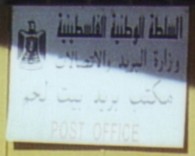 |
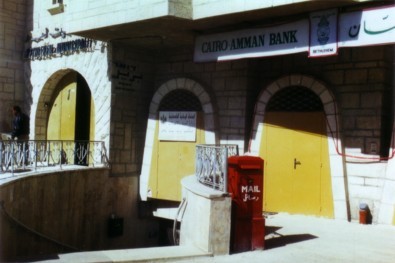 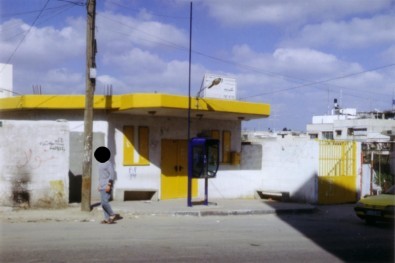 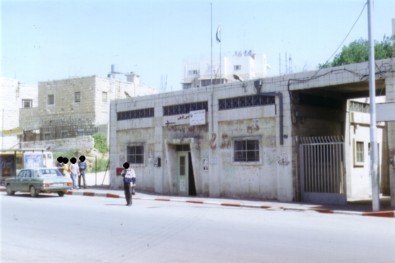 Pictures courtesy of Martin Bohnstedt Pictures courtesy of Martin Bohnstedt |
| During 2010 preparations began for the introduction of a postcode system. Independent of post office numbers (as used on older registration labels) a three-digit system has been developed. The first digit however does not necessarily denote the governorate, the second and third digit towns, villages or groups of villages, and in larger cities districts. On 6 Januery 2011 the ministry published a map and lists of postcode areas followed in June 2011 by an updated version presented via databases and detailed maps: "Postal coding system in Palestine" and Zinnar Address Server. The Ministry of Communications and Information Technology developed a national system of postcodes as part of a project funded by the U.S. Agency for International Development. The importance of this project is that it constitutes a major step for the establishment of a modern Palestinian addressing system, which is essential to the work of the Palestine Post, as well as a key component of e-government to unify data in all government records. The project provides the encoding for each postal area in the West Bank and Gaza Strip. The Palestinian postcode consists of three digits from 100–999, so dividing up the West Bank and Gaza Strip into 900 postal areas, eg. Bethlehem Governorate is divided into 50 areas (from 150–199) and Jenin into 100 areas (200–299). The postcode system is the cornerstone for the ministry to work in the current period of building an automated addressing system of the West Bank and Gaza Strip to be available for use and benefit of all. An automated labeling system will enable the user to search and browse postal areas of the West Bank and Gaza Strip through an interactive map on the Internet. Other types of data such as street names and numbers of buildings will be added on an interactive map enabling the user to access the addresses easily. The system also will provide a fertile creative environment for the private sector for development and innovation in the field of software and applications, especially those based on geo-tagging data. Source: Ministry of Telecom & Information Technology, 6.01.2011. |
| The Stamp Issues of Palestine: 1994 (14 stamps, 1 block, 6 officials) in preparation! 1995 (28 + 2) in preparation! 1996 (24 + 4) in preparation! 1997 (14 + 1) in preparation! 1998 (20 + 4) in preparation! 1999 (37 + 2) in preparation! 2000 (35 + 3, 1 booklet) in preparation! 2001 (24 + 3) in preparation! 2002 (7 + 1) in preparation! 2003 (8 + 1) in preparation! 2004 (no issues) in preparation! 2005 (3 Blocks) in preparation! 2007 (no issues) in preparation! 2008 (4 stamps) (work in progress) 2009 (4 stamps + 1 block, 4 stamps + 1 block unissued, and 5 stamps + 1 block) 2010 (8 stamps, and 20 stamps + 4 blocks) 2011 (4 stamps + 2 blocks, 40 stamps + 3 blocks) 2012 (4 stamps + 3 blocks, 1 booklet, 5 stamps unissued, and 16 stamps + 2 blocks)2013 (6 stamps + 2 blocks) (work in progress) 2014 (6 stamps + 4 blocks) (work in progress) Fakes and Forgeries (Pope John Paul II, Chess, Fauna) Price Guide (Market prices realized) |
 On withdrawal of the Israeli military administration from Zone A and (later) Zone B, the Palestinian Postal Administration was established. According to Wallach all outgoing mail had to be franked with Israeli stamps. The stamps printed in Berlin in Summer 1994 (currency "Mils") did not reach Palestine until October, though officially their date of issue is 15.08.1994. I could so far not determine when exactly the post offices were equipped with the new stamps, in any case Israel did not allow outgoing mail franked with Palestinian stamps. Israel declared it would not accept stamps with currency "Mils" or the inscription "Palestine", so the Palestinian Post had to order the Bundesdruckerei Berlin to overprint stamps with "Fils" (officially issued 10.04.1995). According to reports the postmaster of Jericho obliterated "Mils" with _"Fils"_with a small rubber handstamp in June 1995; this local activity was unauthorized. Jericho continued to sell Israeli stamps until November 1995. Israel finally allowed outgoing mail franked with Palestinian stamps in currency "Fils" from 8.11.1995.
On withdrawal of the Israeli military administration from Zone A and (later) Zone B, the Palestinian Postal Administration was established. According to Wallach all outgoing mail had to be franked with Israeli stamps. The stamps printed in Berlin in Summer 1994 (currency "Mils") did not reach Palestine until October, though officially their date of issue is 15.08.1994. I could so far not determine when exactly the post offices were equipped with the new stamps, in any case Israel did not allow outgoing mail franked with Palestinian stamps. Israel declared it would not accept stamps with currency "Mils" or the inscription "Palestine", so the Palestinian Post had to order the Bundesdruckerei Berlin to overprint stamps with "Fils" (officially issued 10.04.1995). According to reports the postmaster of Jericho obliterated "Mils" with _"Fils"_with a small rubber handstamp in June 1995; this local activity was unauthorized. Jericho continued to sell Israeli stamps until November 1995. Israel finally allowed outgoing mail franked with Palestinian stamps in currency "Fils" from 8.11.1995. The Ministry of Telecom & Information Technology describes the postal circumstances as follows: The PNA started directing post sector in May 1994 at Gaza Strip and Jericho then at the other main cities in the West Bank. Post infrastructure at that time was very bad as well as other sectors. Before its withdrawal, Israel did the following:— Disconnecting the post bank services from the main center in Jerusalem. Taking the modern equipment and the programmed computer disks. Imposing restrictions and obstacles on the postal services such as, State Sovereignty: Preventing the Palestinian post administration from being a member at the UPU. Preventing the Palestinian post administration from being free at printing post stamps and to be used at the PNA territories. Instead, Israel imposed restrictions on the Palestinian post stamp specifications regarding the text and currency. The Israel Postal Administration returns back the letters with Palestinian stamps rejected by Israel to be changed by the Palestinian post administration with careless of such procedure results of damage and harm. Work Mechanism: In spite of the clear post agreement text which stipulates allowing the abroad Palestinian post exchanged with Arab countries to be delivered at AL Karama and Al Awda crossings, the Israeli authorities made the obstacles for preventing the post dispatches from and to the PNA territories. Delaying the delivery of the coming post dispatches to the PNA territories via the Israeli post due to recurrent closure or under the pretext of customs and security control . Tearing the dispatches and parcels to have a look on its contents, damaging the presents and children toys as well as other contents. Preventing the post vehicles from transferring the domestic post dispatches between the Northern and Southern Governorates, as a procedure of the un -fulfillment of the postal unity within one region vis a vis all world states . In addition to many troubles caused by the Israeli procedures which prevent adding new services such as EMS, postal money draft and others. Source: Ministry of Telecom & Information Technology website.
The Ministry of Telecom & Information Technology describes the postal circumstances as follows: The PNA started directing post sector in May 1994 at Gaza Strip and Jericho then at the other main cities in the West Bank. Post infrastructure at that time was very bad as well as other sectors. Before its withdrawal, Israel did the following:— Disconnecting the post bank services from the main center in Jerusalem. Taking the modern equipment and the programmed computer disks. Imposing restrictions and obstacles on the postal services such as, State Sovereignty: Preventing the Palestinian post administration from being a member at the UPU. Preventing the Palestinian post administration from being free at printing post stamps and to be used at the PNA territories. Instead, Israel imposed restrictions on the Palestinian post stamp specifications regarding the text and currency. The Israel Postal Administration returns back the letters with Palestinian stamps rejected by Israel to be changed by the Palestinian post administration with careless of such procedure results of damage and harm. Work Mechanism: In spite of the clear post agreement text which stipulates allowing the abroad Palestinian post exchanged with Arab countries to be delivered at AL Karama and Al Awda crossings, the Israeli authorities made the obstacles for preventing the post dispatches from and to the PNA territories. Delaying the delivery of the coming post dispatches to the PNA territories via the Israeli post due to recurrent closure or under the pretext of customs and security control . Tearing the dispatches and parcels to have a look on its contents, damaging the presents and children toys as well as other contents. Preventing the post vehicles from transferring the domestic post dispatches between the Northern and Southern Governorates, as a procedure of the un -fulfillment of the postal unity within one region vis a vis all world states . In addition to many troubles caused by the Israeli procedures which prevent adding new services such as EMS, postal money draft and others. Source: Ministry of Telecom & Information Technology website. Returned letter, sent "via Jordan", with transit mark "Amman Int ... Outbound ... 13 SEP 2008"; yet no proof for a direct routing from Jordan.
Returned letter, sent "via Jordan", with transit mark "Amman Int ... Outbound ... 13 SEP 2008"; yet no proof for a direct routing from Jordan.
 Two letters sent from Beit Ummar and Halhul direct to Kuwait: both were returned to the sender's address in Austria. A sign that the route via Jordan is not (yet?) in operation...Images courtesy Martin.
Two letters sent from Beit Ummar and Halhul direct to Kuwait: both were returned to the sender's address in Austria. A sign that the route via Jordan is not (yet?) in operation...Images courtesy Martin.
 Governorate 94 04 08 OV Changes North Gaza 3 4 4 2 Jabalia (1999) Gaza 4 4 5 3 Alremal (closed 1996), Omer El Mokhtar (1996), Central Sorting Office Deir el-Balah 2 5 5 2 Alburage (1994), Almghazi (1995), Alzewaida (1995) Khan Yunis 2 6 5 5 Abasan Alkabira (1995), Algrara (1995), Alamel (1995–?), Khuzaa (1997) Rafah 1 3 3 3 Alawda Crossing (1995–?), Tal El Soltan (1995), Terminal Rafah (1995–1998?) Gaza Strip 12 22 22 15 Jenin 5 10 12 14 Alzebabda (1995), Alyamoon (1998), Sielet Alharethiya (1998), Maythelon (2003), Kfer Raei (2003), Ajja (2003), Alkafreyat (2005) Tubas 1 2 2 2 Alfar'a Camp (2005?) Tulkarm 4 7 8 10 Baga Shargeia (1997), Balaa (1998), Qeffin (2001), Illar (2005) Qalqilya 2 4 7 2 Hebla (1997), Kefer Qaddom (2003), Jayyus (2004), Hajja (2005), Kafr Thulth (2005) Salfit 2 2 3 4 Bedia (1995), Deir Istiya (2005) Nablus 1 3 5 24 Beit Amraen (1997), Asira Ashamaliya (?), Burqa (2005) Ramallah & Al-Bireh 8 13 14 27 Ramallah Government Complex (1996), Ebwin (1997), Mazrae Sharqia (2001), Beir Nbala (2001), Babi Zaed (2002), Central Sorting Office, Beit Liqya (2005) Jericho 1 2 1 3 Alkarama Crossing (1999–?) Jerusalem 2 2 3 12 Alram (closed 1995), Biddu (2005?) Bethlehem 3 4 5 11 Zatera (1997), Al-'Ubeidiya (2005) Hebron 7 11 13 15 Alsamoa (1997), Haram Ibrahimi (2002), Sorif (2003), Bani Naem (2003), Ishna (2004), Beit Ula (2005) Westbank 37 60 73 124 PNA 49 82 95 139
Governorate 94 04 08 OV Changes North Gaza 3 4 4 2 Jabalia (1999) Gaza 4 4 5 3 Alremal (closed 1996), Omer El Mokhtar (1996), Central Sorting Office Deir el-Balah 2 5 5 2 Alburage (1994), Almghazi (1995), Alzewaida (1995) Khan Yunis 2 6 5 5 Abasan Alkabira (1995), Algrara (1995), Alamel (1995–?), Khuzaa (1997) Rafah 1 3 3 3 Alawda Crossing (1995–?), Tal El Soltan (1995), Terminal Rafah (1995–1998?) Gaza Strip 12 22 22 15 Jenin 5 10 12 14 Alzebabda (1995), Alyamoon (1998), Sielet Alharethiya (1998), Maythelon (2003), Kfer Raei (2003), Ajja (2003), Alkafreyat (2005) Tubas 1 2 2 2 Alfar'a Camp (2005?) Tulkarm 4 7 8 10 Baga Shargeia (1997), Balaa (1998), Qeffin (2001), Illar (2005) Qalqilya 2 4 7 2 Hebla (1997), Kefer Qaddom (2003), Jayyus (2004), Hajja (2005), Kafr Thulth (2005) Salfit 2 2 3 4 Bedia (1995), Deir Istiya (2005) Nablus 1 3 5 24 Beit Amraen (1997), Asira Ashamaliya (?), Burqa (2005) Ramallah & Al-Bireh 8 13 14 27 Ramallah Government Complex (1996), Ebwin (1997), Mazrae Sharqia (2001), Beir Nbala (2001), Babi Zaed (2002), Central Sorting Office, Beit Liqya (2005) Jericho 1 2 1 3 Alkarama Crossing (1999–?) Jerusalem 2 2 3 12 Alram (closed 1995), Biddu (2005?) Bethlehem 3 4 5 11 Zatera (1997), Al-'Ubeidiya (2005) Hebron 7 11 13 15 Alsamoa (1997), Haram Ibrahimi (2002), Sorif (2003), Bani Naem (2003), Ishna (2004), Beit Ula (2005) Westbank 37 60 73 124 PNA 49 82 95 139 


 Pictures courtesy of Martin Bohnstedt
Pictures courtesy of Martin Bohnstedt